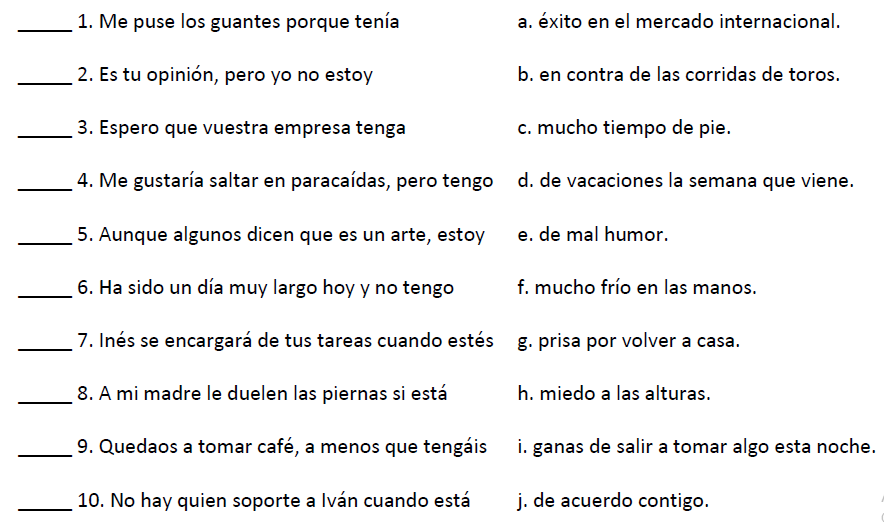El pasado perfecto o pluscuamperfecto de subjuntivo; El condicional perfecto. Completa las siguientes situaciones hipotéticas imposibles. Luego, contesta cada pregunta con oraciones completas. ¡OJO! Cuidado con la concordancia de los tiempos.
1. Si tú ????????????????????????????? (ser) Sor Juana Inés de la Cruz en el siglo XVII,
¿qué ?????????????????????????? (cambiar) de tu sociedad?
2.¿Qué ????????????????????????? (sentir) tú hoy si tu profesor(a) de español no ?????????????????????? (venir) a la clase con esta prueba?
3. Si los españoles ????????????????????????????? (colonizar) toda América del Norte en los siglos XVI y XVII, ¿cómo ????????????????????????????? (ser) diferente este país?
4.¿Qué ?????????????????????????? (pasar) si Colón ?????????????????????????? (llegar) a la India y no al Caribe?
1. fueras/fueses o hubieras/hubieses sido; cambiarías o habrías cambiado
2. sentirías o habrías sentido; viniera/viniese o hubiera/hubiese venido
3. hubieran/hubiesen colonizado; sería o habría sido
4. habría pasado; hubiera/hubiese llegado
You might also like to view...
Am Sonntag fragt Hannah Leo: „Leo, wo warst du?“
Berichten Sie (report) mit indirekter Rede, was diese Leute sagen, und benutzen Sie dabei den Konjunktiv in der Zeit (tense) der direkten Rede, wie in dem Beispiel.
Conecte las siguientes oraciones de modo que las expresiones con los verbos estar y tener estén correctamente emparejadas.

Hablo muchos idiomas, como por ejemplo el español, el francés y el italiano. ______________________________________
Lee cada descripción sobre los intereses de diferentes estudiantes y escribe el nombre de una profesión que le convendría a cada uno.
"When I Heard the Learn'd Astronomer"--Walt Whitman In the first four lines, what is the poet's purpose in repeating the word "When" and increasing the length of each line?
A. To establish the idea that the speaker is listening to an educated scientist B. To establish the atmosphere of the stuffy lecture room C. To show that the audience is enjoying the lecture D. To present the irony of an astronomer who never mentions the stars